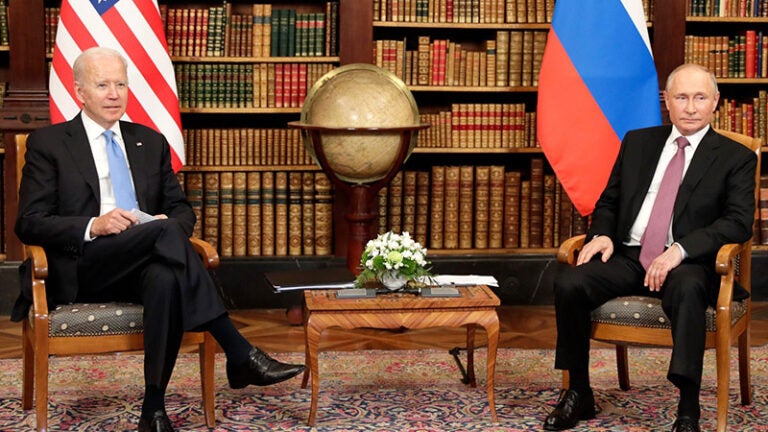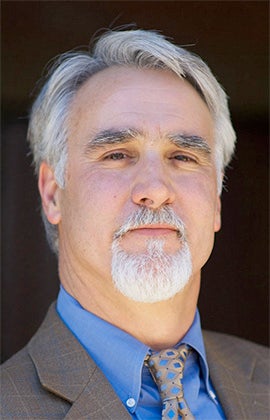
Russian troops on Ukraine’s border drive up tensions in Moscow and Washington. An expert weighs in.
In brief:
- Putin’s endgame with Ukraine depends partly on ours: Will the U.S. compromise on Russia’s security demands or bring Ukraine into NATO?
- Many Europeans don’t want Ukraine in NATO. Some are frustrated the country took billions in aid while failing to tackle economic reforms or fight corruption.
- Biden’s “nuclear option” for economic sanctions against Russia is to cut off the country from the global banking and financial systems.
- Some European allies want a reduction in sanctions against Russia and to resume normal trade and investment ties.
As Russia increases its military presence on the Ukranian border, raising fears Putin may soon invade the country, Robert English, associate professor of international relations, Slavic languages and literature and environmental studies at the USC Dornsife College of Letters, Arts and Sciences, assesses the mounting tensions between the U.S. and Russia and President Joe Biden’s recent meeting with Russian President Vladimir Putin.

Robert English. (Photo: Dietmar Quistorf.)
English, formerly a policy analyst for the U.S Department of Defense and the Committee for National Security, is an expert on Russia and the former Soviet Union in the USC Dornsife School of International Relations.
Biden warned Putin there would be economic consequences if Russia increases its military presence near Ukraine. But is there much additional, meaningful economic pressure he can inflict?
On the economic side, the answer is that the West could indeed hit Russia with really crippling economic sanctions — the “nuclear” option being to cut Russia off from the global banking and financial systems. But would we push that button? Short of a full-scale invasion, I think not. In fact of late, some European countries have been arguing to reduce sanctions on Russia and resume normal trade and investment ties. Because the sanctions are hurting business in Germany, Italy, Austria and elsewhere. Western countries are divided here and Putin is not likely to unify them by launching a large-scale invasion that could easily turn into a military disaster notwithstanding their advantage in troops and tanks.
So, if the conflict in Eastern Ukraine does escalate, it’ll probably be smaller “hybrid” actions combining small incursions with cyberattacks and disinformation.
What are all the competing considerations the Biden administration has to weigh when developing its response to Putin’s aggressions toward Ukraine?
Mainly that many Europeans see the Russia-Ukraine standoff differently than Washington does. Some are already dead set against admitting Ukraine to NATO. Others are frustrated at Ukraine’s taking billions in aid while failing to tackle economic reforms or fight corruption. They don’t idealize the Ukrainians as we do, perhaps also because the consequences of war in Europe hit them directly while the U.S. remains at a safe distance. In other words, they remember the invasion of Iraq and bombing of Libya — things we’ve mostly forgotten, but whose bill they are still paying in the form of refugees and terror attacks from a shattered Mideast. So, they are more cautious about actions that might provoke Russia, and Washington cannot act without consulting Berlin, Paris and London.
What’s your assessment of the Biden administration’s ability to respond to Putin’s aggressions against the U.S. and our allies, relative to the Trump administration?
Their ability is about the same; it’s their willingness that is different. Trump seemed not to care about Ukraine except as a pawn in his campaign against Biden, whereas Biden cares deeply about Ukraine, and has long been its strong supporter. Biden is also trying to cultivate our European allies, not alienate them, so we can expect a more coordinated as well as concerted policy here.
What is Putin’s endgame with Ukraine and do you think he’ll take similar action regarding other former Soviet republics? If so, what should the U.S. and NATO do to preempt that?
I don’t believe that Putin wants to take over or reintegrate Ukraine with Russia; he knows that is impossible at this point. But he is dead-set against Ukraine joining NATO and seeing new NATO deployments near Russian borders, on the Black Sea, etc. Putin’s endgame depends partly on ours — are we willing to compromise over Russia’s security demands, or are we determined to bring Ukraine into the Western military alliance?